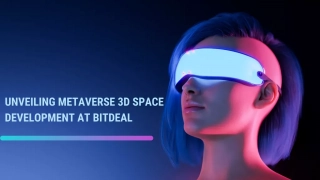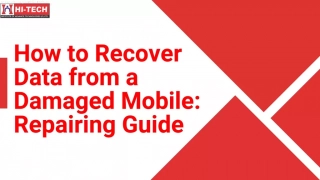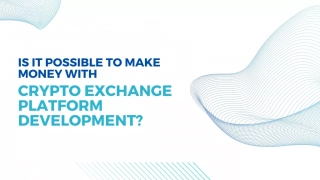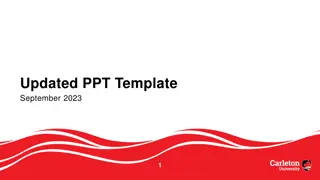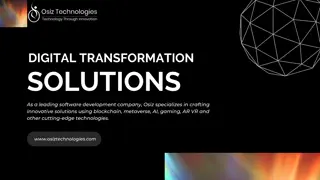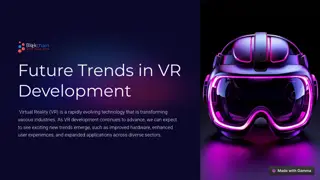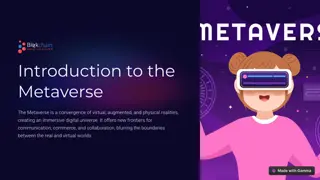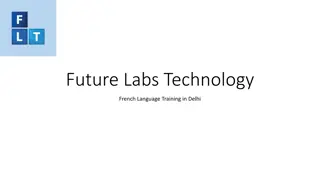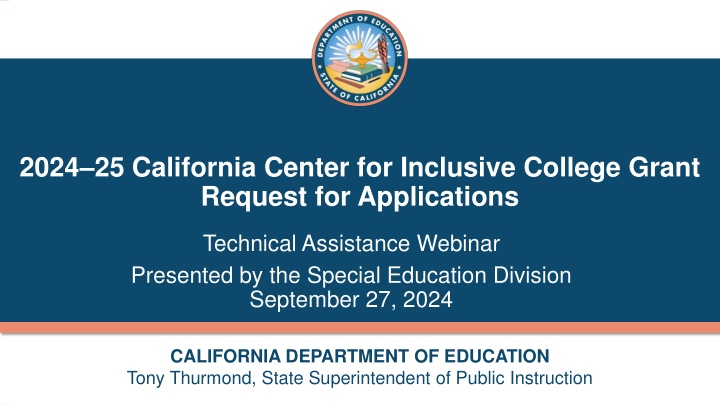
California Center for Inclusive College Grant - RFA and Program Overview
Discover the California Center for Inclusive College (CCIC) Grant Request for Applications (RFA) and program details. Learn about inclusive college programs for students with disabilities in California higher education institutions. Get insights on transition services, funding initiatives, and academic opportunities for students with intellectual disabilities.
Download Presentation

Please find below an Image/Link to download the presentation.
The content on the website is provided AS IS for your information and personal use only. It may not be sold, licensed, or shared on other websites without obtaining consent from the author. If you encounter any issues during the download, it is possible that the publisher has removed the file from their server.
You are allowed to download the files provided on this website for personal or commercial use, subject to the condition that they are used lawfully. All files are the property of their respective owners.
The content on the website is provided AS IS for your information and personal use only. It may not be sold, licensed, or shared on other websites without obtaining consent from the author.
E N D
Presentation Transcript
202425 California Center for Inclusive College Grant Request for Applications Technical Assistance Webinar Presented by the Special Education Division September 27, 2024 CALIFORNIA DEPARTMENT OF EDUCATION Tony Thurmond, State Superintendent of Public Instruction
Overview and Questions Visit the California Center for Inclusive College (CCIC) Grant Request for Applications (RFA) for more information. If you have questions regarding the 2024 25 CCIC Grant RFA, please submit them through the webinar chat function. A copy of this presentation will be uploaded onto the California Department of Education (CDE) CCIC Grant RFA web page. Additional questions regarding this webinar or the RFA can be emailed to the CDE at PPL@cde.ca.gov with 2024 CCIC RFA Questions for the subject line. 2
I. Background (1) Under the Individuals with Disabilities Education Act (IDEA), Section 300.43 (a)(1) (External Source), all students are entitled to transition services. oSince 2011, the United States Department of Education has provided grants to institutions of higher education, or consortia of institutions of higher education The state Budget Act of 2023 enacted Education Code (EC) Sections 66030 66031, which directed the California State University and the University of California to establish and maintain inclusive college programs for students with intellectual and developmental disabilities at four-year public postsecondary educational institutions. With the passage of the state Budget Act of 2024, state funds were appropriated to enact EC Sections 66032 66032.2 to further support inclusive college for students with disabilities. In accordance with EC Section 66032.1(b), inclusive college programs are defined as: 3
I. Background (2) Inclusive college program means a college program administered by a public postsecondary educational institution for students with intellectual disabilities in the state that offers students an inclusive program of study that includes opportunities to take courses, learn independent living skills, have employment experiences, and engage in social activities and organizations in a setting with other peers with and without disabilities, and that requires students with intellectual disabilities to have at least one-half of their participation in the program, as determined by the institution, focus on academic components through one or more of the following activities: 1) Taking credit-bearing courses with students with and without disabilities. 2) Auditing or otherwise participating in courses with students with and without disabilities for which the student does not receive regular academic credit 4
I. Background (3) 3) Taking noncredit-bearing, nondegree courses with students with and without disabilities. 4) Participating in internships or work-based training in settings with individuals with and without disabilities. California strives to establish and expand upon existing inclusive college programs with the goal of providing access to college programs for students with intellectual and developmental disabilities at four-year public postsecondary educational institutions. Comprehensive transition and postsecondary programs are critical as California continues to work toward improving education and postschool outcomes for students and young adults with disabilities. 5
II. Program Purpose and Goals Pursuant to the state Budget Act of 2024, Assembly Bill (AB) 447, Chapter 2, EC Section 66032, it is the intent of the Legislature that the CCIC do the following: 1. Increase awareness of, and access to, inclusive and experiential postsecondary education and employment opportunities for students with intellectual disabilities through degree, certificate, or nondegree programs 2. Establish statewide support and coordination of the dissemination of information regarding programs and services for students with intellectual disabilities 3. Increase access to meaningful postsecondary education credentials and work experiences to afford students with intellectual disabilities inclusive and meaningful campus experiences 4. Establish and expand programs on college campuses that model inclusivity of all students, including those with intellectual disabilities 6
III. Eligibility Requirements and Funding Available (1) Per EC Section 66032.2(a), individual applicants must be a COE that works in partnership with its local regional center, its local public postsecondary educational institutions, and the University of California, Davis MIND Institute. Per EC Section 66032.2(b), commencing with Fiscal Year (FY) 2024 25, the CDE will award one grant to one selected COE in the amount of two million dollars ($2,000,000) annually for a term ending no later than FY 2028 29. oGrant awards issued thereafter through FY 2028 29 is contingent upon the availability of annual funds. This RFA covers the grant period beginning July 1, 2024, through June 30, 2025. 7
III. Eligibility Requirements and Funding Available (2) Pursuant to EC Section 66032.2(d) for the 2024 25 Fiscal Year, of the amount appropriated, up to five hundred thousand dollars ($500,000) shall be available for the center to convene an advisory workgroup. The advisory workgroup must consist of representatives from at least two, but not more than five, existing inclusive college programs throughout the state. As per EC 66032.2(d)(1), these centerswill consult with the center to do all the following: (A) Collect and share best practices for inclusive college programs. (B) Advise and assist the center in determining areas of greatest need for technical assistance for inclusive college programs. (C) Support the center in exploring methods of capacity building to strengthen existing inclusive college programs. 8
III. Eligibility Requirements and Funding Available (3) Per EC Section 66032.2(d)(2), each inclusive college program with representatives in the advisory workgroup shall be reimbursed for any actual and necessary expenses incurred in connection with their participation in the advisory workgroup. The amount cannot exceed one hundred thousand dollars ($100,000) for each inclusive college program. The up to $500,000 amount allocated for convening the advisory workgroup is part of the overall $2 million grant. 9
IV. Project Requirements (1) In accordance with EC Section 66032.2(c), the responsibilities of the center shall include, but are not limited to, all of the following: 1) Assisting inclusive college programs in aligning with the federal requirements, standards, and quality indicators identified by the National Center for Information and Technical Support for Postsecondary Students with Disabilities and the coordinating center described in 20 U.S.C. Sec. 1140q(b), pursuant to 20 U.S.C. Sec. 1140q. 2) Assisting inclusive college programs with the development and submission of federal comprehensive transition and postsecondary program applications. 3) Facilitating collaboration between local educational agencies, regional centers, local Department of Rehabilitation field offices, and inclusive college programs to support students with intellectual disabilities and their parents, families, and supporters to plan for postsecondary transition. 10
IV. Project Requirements (2) 4) Assisting public postsecondary educational institutions and inclusive college programs with the identification of potential funding sources to establish, sustain, or expand upon inclusive college programs, including student financial assistance opportunities. 5) Supporting inclusive college programs with guidance and assistance when applying for potential funding sources and student financial assistance opportunities. 6) Holding meetings and annual workshops to share best practices and provide technical assistance on developing and establishing an inclusive college program, including opportunities to transition two-year programs to four-year programs and to incorporate a residential living component. 11
IV. Project Requirements (3) 7) Disseminating to local educational agencies, local Department of Rehabilitation field offices, and regional centers information about, but not limited to, all the following: (A) Education programs, services, and resources that are available at inclusive college programs. (B) Supports, accommodations, technical assistance, and training provided by inclusive college programs. (C) Mentoring, networking, and employment opportunities available at inclusive college programs. 12
IV. Project Requirements (4) 8) Meet regularly with interested parties, including, but not limited to, people with intellectual disabilities and their parents, families, and supporters; staff of the State Department of Education, the State Board of Education, the State Department of Developmental Services, the Department of Rehabilitation, and the State Council on Developmental Disabilities; and public postsecondary educational institutions, with the goal of providing continuous improvement to the delivery of inclusive college programs to students with intellectual disabilities, by doing both of the following: (A) Identify federal grant funding opportunities for state agencies and assisting inclusive college programs in investigating options for long-term programmatic and fiscal sustainability. (B) Share best practices, barriers, and challenges to establishing or expanding inclusive college programs. 13
IV. Project Requirements (5) As per EC Section 66032.2(d)(1), for FY 2024 25, up to five hundred thousand dollars ($500,000) shall be available for the center to convene an advisory workgroup consisting of representatives from at least two, but not more than five, existing inclusive college programs throughout the state to consult with the center and to do all of the following: (A) Collect and share best practices for inclusive college programs. (B) Advise and assist the center in determining areas of greatest need for technical assistance for inclusive college programs. (C) Support the center in exploring methods of capacity building to strengthen existing inclusive college programs. 14
IV. Project Requirements (6) EC 66032.2(d)(2), each inclusive college program with representatives in the advisory workgroup shall be reimbursed for any actual and necessary expenses incurred in connection with their participation in the advisory workgroup, in an amount not to exceed one hundred thousand dollars ($100,000) for each inclusive college program. EC 66032.2(e) To the extent practicable, the center shall leverage resources from the National Center for Information and Technical Support for Postsecondary Students with Disabilities and the coordinating center described in 20 U.S.C. Sec. 1140q(b), pursuant to 20 U.S.C. Sec. 1140q, for best practices, frameworks, and effective implementation of programs for students with disabilities, including long- term planning to increase inclusive college programs. 15
IV. Project Requirements (7) EC 66032.2(f) Beginning in the 2025 26 fiscal year, and annually thereafter, on or before March 1 each fiscal year, the center shall provide to the Governor, the Legislature, and the Department of Finance a report regarding the implementation of this section; relevant data, including, but not limited to, student activities and demographic information, to the extent feasible and meaningful to measure access, equity, and outcomes; and recommendations to expand evolving best practices. 16
V. Administrative Requirements (1) Required Forms Applicants must download assurances and certifications and keep on file and available for compliance reviews, complaint investigations, or audits. The CCIC RFA grant assurances and certifications can be found on the CDE Funding Forms web page. Reporting As a condition of grant funding, applicants must collect and submit data annually, starting on March 1, 2026, in accordance with EC Section 66032.2(f) and detailed within Section V of the RFA. Grant Award Notification Applicants selected for grant funding will receive a CDE form AO-400 Grant Award Notification (GAN), the official CDE document that awards funds to grantees. Each grantee must sign and return the notification to the CDE before project work begins and disbursement of funds can be made. 17
V. Administrative Requirements (2) Grant Payments Grantee must sign and submit CDE form AO-400 GAN, submit to the CDE an Interim Expenditure Report no later than February 27, 2025, and submit to the CDE a Final Expenditure Report no later than July 31, 2025. Up to 100 percent of the grant total will be reimbursed upon receipt of the Final Expenditure Report. Indirect Cost Rate The applicant will use and must limit administrative indirect costs to the rate approved by the CDE for the applicable fiscal year in which the funds are spent. For a listing of indirect cost rates, visit the CDE Indirect Cost Rates web page. This rate should be used when submitting the proposed RFA budget. 18
Submitting Form A: Intent to Submit an Application for the CCIC Grant to the CDE Interested applicants must submit Form A: Intent to Submit an Application for the CCIC Grant to the CDE, SED by email at PPL@cde.ca.gov by 5 p.m. on September 30, 2024. The person who submits Form A, Intent to Submit an Application for the CCIC Grant, will be the main contact person on behalf of their organization s application and will be referred hereto as the lead applicant contact. Use 2024 CCIC Grant Intent to Submit Application for the subject line and an email confirmation from CDE will be sent within one business day to the lead applicant contact. Submitting this Form does not require an LEA to apply, however, an application will not be accepted if the applicant organization has not submitted this form by the required deadline. 19
VI. Selection Process All applications will be screened to ensure all components of the RFA are included in the application package as described in RFA Section VIII, Application Format and Submission Requirements, and Section IX, Application Checklist. Only fully completed applications will be considered eligible to be read and scored by trained readers per the rubric found in Appendix I of this RFA. Points will be awarded based on completeness and responsiveness of the application to each of the required application components. An application must receive a minimum score of 70 points to be eligible to receive the grant award. Final approval of grant awards for successful applications will be decided by the CDE, SED. 20
VII. Application Narrative, Budget, and Appendix (1) Section A. Form B: Application Face Page [not scored] oApplicants shall download and complete Form B: Application Face Page from Section A and attach it to the front of the completed application. oThe 30-page limit requirement does not apply to Form B: Application Face Page Section B. California Center for Inclusive College Program Design [30 points] Section C. Transitional Support for Incoming and Graduating High School Students [10 points] Section D. Inclusive College Advisory Workgroup [20 points] Section E.Community Partnerships [20 points] oAs part of this section, provide a Letter of Support from each community partner contributing to the work of the proposed CCIC in the Appendix. oThe 30-page limit requirement does not include the Letters of Support 21
VII. Application Narrative, Budget, and Appendix (3) Section F. Form C: Project Work Plan [10 points] oApplicants shall complete Form C: Project Work Plan from Section F, which presents the key milestones and tasks of the proposed CCIC program for the first year of the project (July 1, 2024, to June 30, 2025). oThe 30-page limit requirement does not apply to Form C: Project Work Plan. Section G. Organizational Plan and Project Staffing [10 points] oThe 30-page limit requirement does not apply to the resum s, curriculum vitae, and/or proposed position descriptions that are required of subsection G.2. Section H. Data Collection and Program Monitoring [10 points] 22
VII. Application Narrative, Budget, and Appendix (4) Section I. Budget: (1) Form D: Budget, and (2) the Budget Narrative [10 points] oApplicants shall complete item (1) Form D: Budget Detail, and item (2) the Budget Narrative, in Word or Portable Document Format (PDF), to be submitted with the application. oThe 30-page limit requirement does not apply to (1) Form D, Budget Detail workbook, or to the (2) separate Budget Narrative document. Appendix oLetters of Support as described in Section E. Community Partnerships of this RFA oResumes, curriculum vitae, and/or proposed position descriptions of key personnel, as described in Section G. Organizational Plan and Project Staffing of this RFA oThe 30-page limit requirement does not apply to documents within the Appendix. 23
VIII. Application Format and Submission Requirements (1) The formatting and page limit requirements will be carefully evaluated, and applications that do not adhere to these requirements may be disqualified from review: Format: Applications can be submitted in PDF or as a Microsoft Word document Font/Size: Applications must be typed in Arial or Times New Roman font and in 12- point font size Sequence: Applications must follow the alphabetical sequencing as outlined in this RFA. Review Section IX, Application Checklist, for reference. Numbering: All pages beginning with Section A, Form B: Application Face Page, must be numbered sequentially. This includes all forms, narrative sections, documentation, and the appendix documents. Page limit requirement/Margins/Spacing: The application narrative is limited to 30 double-spaced pages formatted to 1 margins. 24
VIII. Application Format and Submission Requirements (2) The 30-page limit requirement does not apply to the following sections and documents: Section A. consists of Form B: Application Face Page Letters of Support from Section E. Community Partnerships Section F. consists of Form C: Project Work Plan Resum s, curriculum vitae, and/or proposed position descriptions of key personnel in the Appendix of the completed application from Subsection G.2. Organizational Plan and Project Staffing Section I. Budget: (1) Form D: Budget Detail workbook, and (2) the Budget Narrative (which is a separate Word or PDF document). Any other documents required in the Appendix. Review Section VII, Appendix, for reference. 25
VIII. Application Format and Submission Requirements (3) All application packages can be submitted via one of the following two methods by the lead applicant contact: 1) Submit in hard-copy format, postmarked no later than 5 p.m. on October 9, 2024, to the following address: California Department of Education Special Education Division Programs and Partnerships Unit ATT: 2024 CCIC Grant RFA 1430 N Street, Suite 2401 Sacramento, CA 95814-5901 2) Submit as a PDF or Microsoft Word document, via email, to PPL@cde.ca.govby 5 p.m. on October 9, 2024. Use 2024 CCIC Grant RFA for the subject line. 26
VIII. Application Format and Submission Requirements (4) The lead applicant contact will receive an email confirmation of the information submitted within one business day. If changes need to be made, the lead applicant contact can resubmit the entire application prior to the submission deadline. The last submitted application version will be the one considered for review. The CDE cannot modify the application information after it is submitted. Incomplete or late applications will not be considered. 27
IX. Application Checklist Section A. Form B: Application Face Page Section B. California Center for Inclusive College Program Design Section C. Transitional Support for Incoming and Graduating Students Section D. Inclusive College Advisory Workgroup Section E. Community Partnerships Section F. consists of Form C: Project Work Plan Section G. Organizational Plan and Project Staffing Section H. Data Collection and Program Monitoring Section I. Budget: (1) Form D: Budget Detail workbook, and (2) the Budget Narrative in a Word or PDF document. Appendix Letters of Support, Resum s, Curriculum Vitae, and/or Proposed Position Descriptions 28
XI. Timeline Activity Important Date RFA Released RFA Technical Assistance Webinar Deadline for Applicants to Submit Notice of Intent to Submit Application for the CCIC Grant (Form A) Deadline for Applicants to Submit Applications CDE Reviewers Evaluate and Score All Eligible Applications Notify Applicants of Score and Appeal Process Deadline for Applicants to Submit Appeal Notification to Applicants of Appeal Decision Posting of Intent to Award Grant Award Notifications Mailed to Grantees September 18, 2024 September 27, 2024, at 11 a.m. September 30, 2024, by 5 p.m. October 9, 2024, by 5 p.m. October 10 16, 2024 October 23, 2024 November 6, 2024 November 20, 2024 December 1, 2024 January 10, 2025 29
XI. Appeal Process (1) Lead Applicant Contacts who wish to appeal an application scoring decision must submit an email to: The CDE at the following email address: PPL@cde.ca.gov Subject line: 2024 CCIC Grant RFA Appeal The email appeal must be received from the Lead Applicant Contact by November 6, 2024, by 5 p.m. The CDE will not consider incomplete or late appeals. Appeals must be submitted electronically using the email address and must include the following: 1. The issue(s) in dispute 2. The legal authority or other basis for the appeal position 3. The remedy sought 30
XI. Appeal Process (2) The appellant may not supply any new information that was not originally contained in the original application. A final decision will be provided in writing within ten business days from the date that appeals are due to the CDE for the CCIC RFAA. The CDE s decision is the final administrative action afforded the appeal. 31
Frequently Asked Questions (1) 1. Is there just one application window? Yes, there is only one application window from September 18, 2024, through October 9, 2024. The activities and important due dates can be found in Section X, Timeline, of the CCIC RFA 2. Will all the readers scoring the completed grant applications be from CDE? Readers will be selected by the CDE and trained to score per the rubric found in Appendix I of the CCIC RFA. More information can be found in Section VI, Selection Process. 32
Frequently Asked Questions (2) 3. Can postsecondary educational institutions or other institutions that are not COEs apply directly for the CCIC grant? No. Pursuant to EC Section 66032.2(a), individual applicants must be a COE that works in partnership with: its local regional center its local public postsecondary educational institutions The University of California, Davis MIND Institute However, postsecondary educational institutions or other institutions are encouraged to collaborate with a COE and submit letters of support. 33
Next Steps Interested applicants must submit Form A: Intent to Submit an Application for the CCIC Grant to the CDE Special Education Division by email at PPL@cde.ca.gov by 5 p.m. on September 30, 2024. Use 2024 CCIC Grant Intent to Submit an Application for the subject line and an email confirmation from the CDE will be sent within one business day. Review SectionX. Timeline of the RFA to adhere to all required deadlines. Refer to SectionVIII. Application Format and Submission Requirements and Section IX. Application Checklist of the RFA before submitting your application. This presentation will be available on the CDE CCIC Grant RFA web page. Additional questions regarding this webinar or the RFA can be emailed to the CDE at PPL@cde.ca.gov with 2024 CCIC RFA Questions for the subject line. 34



